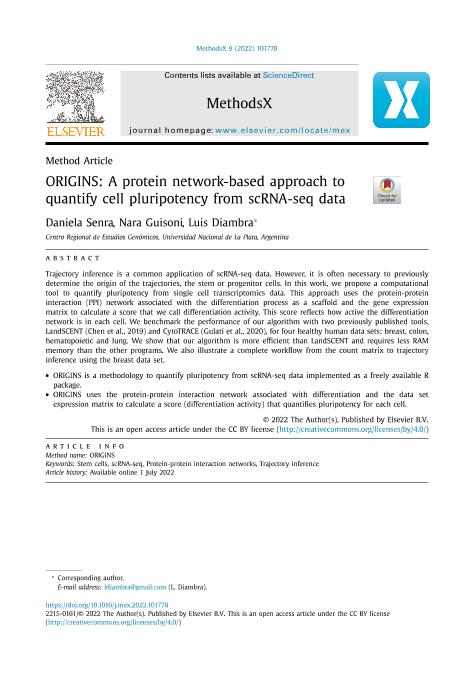Mostrar el registro sencillo del ítem
dc.contributor.author
Senra, Daniela

dc.contributor.author
Guisoni, Nara Cristina

dc.contributor.author
Diambra, Luis Anibal

dc.date.available
2023-02-16T19:06:29Z
dc.date.issued
2022-01
dc.identifier.citation
Senra, Daniela; Guisoni, Nara Cristina; Diambra, Luis Anibal; Origins: A protein network-based approach to quantify cell pluripotency from scRNA-seq data; Elsevier; MethodsX; 9; 101778; 1-2022; 1-12
dc.identifier.uri
http://hdl.handle.net/11336/188303
dc.description.abstract
Trajectory inference is a common application of scRNA-seq data. However, it is often necessary to previously determine the origin of the trajectories, the stem or progenitor cells. In this work, we propose a computational tool to quantify pluripotency from single cell transcriptomics data. This approach uses the protein-protein interaction (PPI) network associated with the differentiation process as a scaffold and the gene expression matrix to calculate a score that we call differentiation activity. This score reflects how active the differentiation network is in each cell. We benchmark the performance of our algorithm with two previously published tools, LandSCENT (Chen et al., 2019) and CytoTRACE (Gulati et al., 2020), for four healthy human data sets: breast, colon, hematopoietic and lung. We show that our algorithm is more efficient than LandSCENT and requires less RAM memory than the other programs. We also illustrate a complete workflow from the count matrix to trajectory inference using the breast data set. • ORIGINS is a methodology to quantify pluripotency from scRNA-seq data implemented as a freely available R package. • ORIGINS uses the protein-protein interaction network associated with differentiation and the data set expression matrix to calculate a score (differentiation activity) that quantifies pluripotency for each cell.
dc.format
application/pdf
dc.language.iso
eng
dc.publisher
Elsevier

dc.rights
info:eu-repo/semantics/openAccess
dc.rights.uri
https://creativecommons.org/licenses/by-nc-sa/2.5/ar/
dc.subject
ORIGINS
dc.subject
PROTEIN-PROTEIN INTERACTION NETWORKS
dc.subject
SCRNA-SEQ
dc.subject
STEM CELLS
dc.subject
TRAJECTORY INFERENCE
dc.subject.classification
Otros Tópicos Biológicos

dc.subject.classification
Ciencias Biológicas

dc.subject.classification
CIENCIAS NATURALES Y EXACTAS

dc.title
Origins: A protein network-based approach to quantify cell pluripotency from scRNA-seq data
dc.type
info:eu-repo/semantics/article
dc.type
info:ar-repo/semantics/artículo
dc.type
info:eu-repo/semantics/publishedVersion
dc.date.updated
2023-02-09T15:16:19Z
dc.identifier.eissn
2215-0161
dc.journal.volume
9
dc.journal.number
101778
dc.journal.pagination
1-12
dc.journal.pais
Países Bajos

dc.description.fil
Fil: Senra, Daniela. Universidad Nacional de La Plata. Centro Regional de Estudios Genómicos; Argentina. Consejo Nacional de Investigaciones Científicas y Técnicas. Centro Científico Tecnológico Conicet - La Plata; Argentina
dc.description.fil
Fil: Guisoni, Nara Cristina. Universidad Nacional de La Plata. Centro Regional de Estudios Genómicos; Argentina. Consejo Nacional de Investigaciones Científicas y Técnicas. Centro Científico Tecnológico Conicet - La Plata; Argentina
dc.description.fil
Fil: Diambra, Luis Anibal. Universidad Nacional de La Plata. Centro Regional de Estudios Genómicos; Argentina. Consejo Nacional de Investigaciones Científicas y Técnicas. Centro Científico Tecnológico Conicet - La Plata; Argentina
dc.journal.title
MethodsX
dc.relation.alternativeid
info:eu-repo/semantics/altIdentifier/doi/http://dx.doi.org/10.1016/j.mex.2022.101778
dc.relation.alternativeid
info:eu-repo/semantics/altIdentifier/url/https://methods-x.com/article/S2215-0161(22)00158-3/fulltext
Archivos asociados
